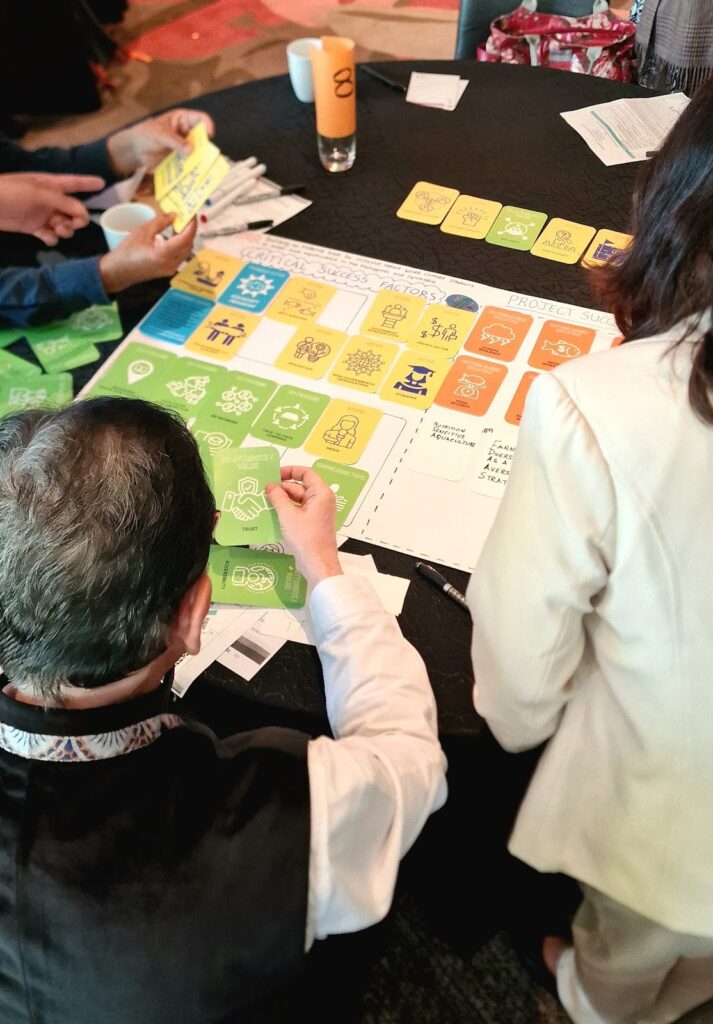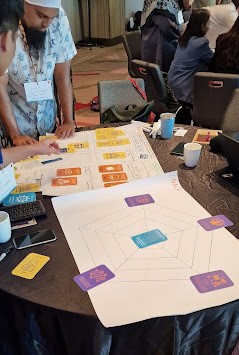Throughout 2024, the Dgroups Foundation has been partnering with AQUADAPT (Nature-based Climate Solutions in Aquaculture in Asia-Pacific) on the scoping and design of a knowledge management platform that fosters peer learning, interaction across projects, and streamlined monitoring data collection and analysis.

As part of an extensive user-needs consultation, Dgroups Associate Jessica Ball was invited to the AQUADAPT Peer Learning event in Penang, Malaysia. For this event, Jessica created and facilitated a “Visions of Success” session aimed at helping each of the 11 AQUADAPT projects outline their own success roadmaps, contributing valuable insights toward the program-wide Theory of Change (ToC).
Given the 90-minute timeframe, Jessica developed an engaging and dynamic card game for the activity.
Each project group received a tailored deck of cards and instructions. The card deck included:
- the 11 projects and the IDRC program actor cards;
- 22 actor cards ranging from women aquafarmers to large aquabusiness;
- 7 nature-based solutions cards;
- 26 cards representing knowledge management types, values, attributes, processes and tools; and
- 4 interaction cards – learn, share, co-create, and report.
A shared vision is an important element of project and program success and the aim of the exercise was to focus on what success looks like for each project. It allowed for projects to consider a range of success factors, ranging from learning and development of new ideas and approaches, benefits to communities, sustainability of projects, etc.
The activity process was designed in four stages:

- WHY: Each project team created a visual representation or story of what tangible success would look like, integrating nature-based solutions relevant to their objectives.
- WHAT: Using a storyboard template, teams mapped out the key success factors necessary to achieve their vision.
- WHO: Teams reflected on the key actors essential to their success, both from within the program and externally.
- HOW: Using the knowledge management cards, the final step was for projects to think about how the AQUADAPT KM Platform and processes of learning and collaboration can support them in achieving their project success. Using a spider diagram template, teams mapped actors and actions along the co-create, share, learn, and report axis to identify crucial interactions.
Each project group was requested to capture their outcomes of the activity, in the form of video, audio or written notes. This collaborative knowledge harvesting approach meant that after the event, Jessica was able to review all the project Visions of Success in detail. From this a summary document was created that included a synthesised vision of success as laid out by all 11 projects. Cross-checking this with the program theory of change impact provides a holistic program vision of success, and allows all projects to clearly see their contribution, and feel a sense of ownership and shared purpose in the overall success of the programme.
The activity revealed the unique approaches each project took, underscoring that successful collaboration doesn’t require a one-size-fits-all method. With a creative framework, the card deck facilitated shared understanding and successful collaboration across the board.
Feedback from the activity was overwhelmingly positive. IDRC Project Manager Rebecca McMillan highlighted that:
Participants reported immediately after that it was “fun,” helped promote “co-creation,” enabled them to cement a “clear vision,” and facilitated team communication. “Using visualised cards made the discussion easier,” said one participant. Another partner noted, “very positive energy – we can use that to make change happen!” A third wrote, “The exercises served as equalisers – truly emerging as PEER learning.” In the post-event survey, we asked participants which activities they most enjoyed from the three-day event. The Theory of Change/Visions of Success activity was the most frequently cited.
Based on the success of this activity and the card deck, the Dgroups Foundation is keen to work with other partners looking to apply this approach to their knowledge management strategy development. Please get in touch if you would like to find out more information and discuss how this could be adapted to your needs.